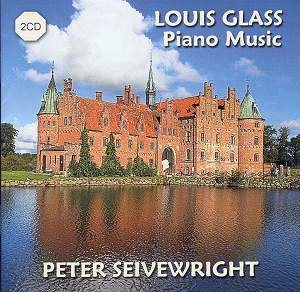Itís difficult to know
what to make of Louis Glass. Heís one
of those composers who rather flatter
to deceive, who begin with a flourish
and tend to end in prolixity. Or thatís
the impression one often gets. Peter
Seivewrightís mission naturally is to
prove the virtues in Glassís Beethovenian-inspired
melodrama and to convey it with articulacy
and proper scale. I canít fault his
proselytising but I still have problems
with Glass.
Itís interesting that
Seivewright prefers the A flat major
sonata. One can see why. Itís a bigger,
bolder work than the more youthful E
major, which Seivewright tends rather
to slight. But I have a sneaking admiration
for the Op.6. The later A flat major
sonata opens with bullish Beethovenian
rhetoric, ambles into romantic pastures
- it was published in 1898 Ė and then
slows right down. Dynamics here are
extreme, themes return with rather repetitious
regularity. My own instinct was that
the music should be taken much faster
but Seivewright is a sagacious guide
and one should trust his judgement.
Seivewrightís booklet digression on
the Chromatic Fourth in the second movement
would infuriate the Editor but quite
interested me, though like many an eminent
High Court judge Iíve never heard Miss
You Like Crazy by Natalie Cole.
Those moments in the second movement
that owe their genesis anywhere perhaps
owe most to Mussorgsky, a composer Seivewright
doesnít mention - though he does mention
Bach, Purcell, Wagner and the song sung
by Miss Cole.
Iím afraid that hereafter
Glassís inspiration runs pretty empty.
The scherzo, despite the pianistís best
protestations, is a trudge and the finale,
whilst it revisits earlier material
goes nowhere. I canít sympathetise with
the idea that the scherzo boasts a "sublime
four-part counterpoint" Ė it might
be lucid to play but itís prolix to
hear.
The earlier sonata
attempts slightly less and achieves
slightly more, at least in my book.
Again there are touches of Beethovenian
power but also leavenings of Grieg.
Itís a more coherent statement, though
only slightly shorter, than the Op.25
sonata though one would have to admit
that itís very much more conventional
in tone. I greatly took to the central
panel of the scherzo with its rather
beautiful melodic impress, surrounded
as it is by more extrovert writing.
The finale is again rather paragraphal
and lacking in cumulative direction.
But as a sonata I found it the more
engaging.
The Fantasi was
apparently Glassís most popular work
during his lifetime. It does have grandeur
and it does have a quasi-improvisatory
spirit that command attention. But itís
simply too long and for stretches one
loses interest. The smaller pieces show
us the miniaturist. They consist of
character studies, little elfin dances
or romances, small moments of concise
nobility. The Lyrical Bagatelles whiz
by but the Op.66 Piano Pieces are cut
from a rather deeper cloth. Thereís
even a rather assertive Ecossaise. The
Op.4 set is pure Schumann - with a twist
of Bach for the fifth, In The Rain.
Theyíre not referred to in the booklet
notes so far as I can see.
Iím not in a position
to compare this two disc set with Nina
Gadeís recital on DCCD9306 Ė she plays
the sonatas and the Fantasi.
But Peter Seivewright is a powerful
and obviously convinced exponent who
once again shows his mettle here. For
me itís a losing cause but for others
it may well prove, given the sympathetic
recordings, a more enjoyable introduction
to Glassís piano oeuvre.
Jonathan Woolf


